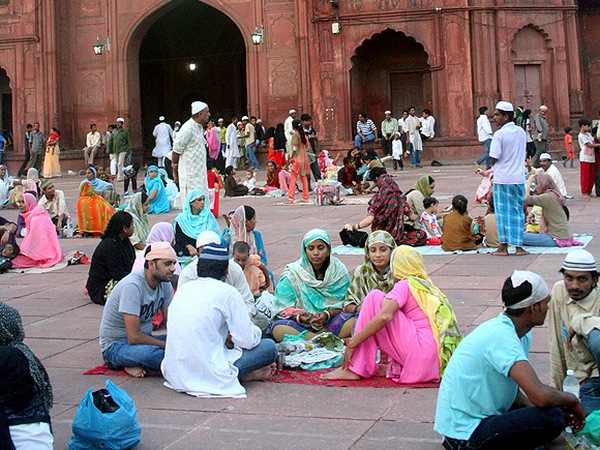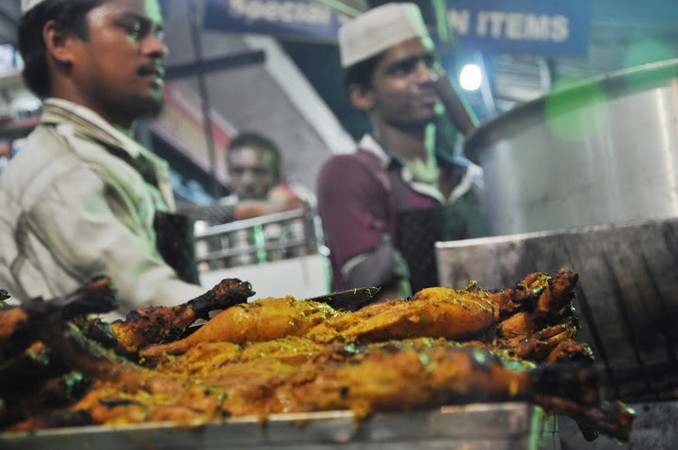 | « Back to article | Print this article |
Observing Ramzan: Solemn celebrations with a Muslim family
Ramadan evenings are solemn celebrations of days spent fasting. Nitin Sreedhar joins a family in the ritualistic iftar meal.
A platter of freshly-cut fruit, crisp pakoras, cheese and shredded chicken on toasted pizza bread - these are few of the many items laid out for the iftar meal. The holy month of Ramadan is always a special occasion for Junaid Ahmed and his family which lives in Inderlok in north Delhi. Ramadan, as we know, is the month of fasting and anticipating Eid. I had been to an iftar meal once before, but hadn't understood the essence of it, until now.
I am the guest of Ahmed's family which has been fasting for over 15 hours. None of the members has eaten a morsel or had a drop of water from 4:05 in the morning till 7:15 in the evening. Sehri is the meal consumed early morning (4:05 am) which generally includes feni and khajla that go along with either milk or tea.
"The sawab (reward) one earns for fasting during Ramadan is considered very precious," says Ahmed's grandmother, Anisa Abdul Samad. "Everyone fasts, and in case someone does not keep a roza, there should be a genuine reason for that."
We have grown up hearing that a roza can be broken by either eating khajoor (date) or having water. What if none is available? "Then, one can break the roza by having a pinch of salt," says Abdul Samad Ansari, Ahmed's grandfather.
Observing Ramzan: Solemn celebrations with a Muslim family
The iftar meals are not restricted to the family. "We always have other close family members and friends over for it. That is something we call a proper daawat¸ where 30 to 40 people dine together," says Ahmed.
There are many more traditional dishes which are prepared for the iftar. Haleem, which is also a West Asian dish, is a sumptuous stew made with meat, lentils and wheat. It tastes marvellous if coupled with biryani. The dessert section is usually loaded with dishes such as kheer, sewaiya and fruit-custard. Another popular trend now is to include special chocolate-coated dates that can be had along with the meal.
The dastarkhwan (table cloth) looks exquisite with the food laid out on it. The family sits together and breaks the roza. I have lost count of the number of dishes on the table and the credit for this goes to Ahmed's mother, Mahmooda. "We start preparing the dishes by 5 in the evening, but the basic preparations continue through the day," she says. "The toughest part is to get all the ingredients right since we cannot taste the food when it is being made."
As the clock strikes 7:15 pm, the family breaks the roza with khajoor and a glass of water. The water is especially brought from the well of Zamzam located within the Masjid al-Haram in Mecca, Saudi Arabia. The one dish that is omnipresent is fruit chaat which is served with chane ki daal and mangoes. There is also Basbousa, a West Asian sweet cake made from rava, egg and sugar.
To go with the food are two kinds of sherbets: Roohafza and another which is made from the flowers of karkare - a rose-like flower which is dried and then used for the sherbet. This is said to be beneficial for people with high blood pressure.
There is also a modern twist to the traditional fare -- chicken chowmein garnished with shredded boiled eggs, deep fried chicken roll, chicken pizza sandwich. There is also vegetable pakora served with a tangy tomato and green chilly chutney.
It's a warm and unforgettable experience. The meal ends with Ahmed and I enjoying a cup of kahwa, Kashmiri tea made from cardamom, sugar and saffron, minus the milk. After this, the entire family heads out for namaaz (prayers).


